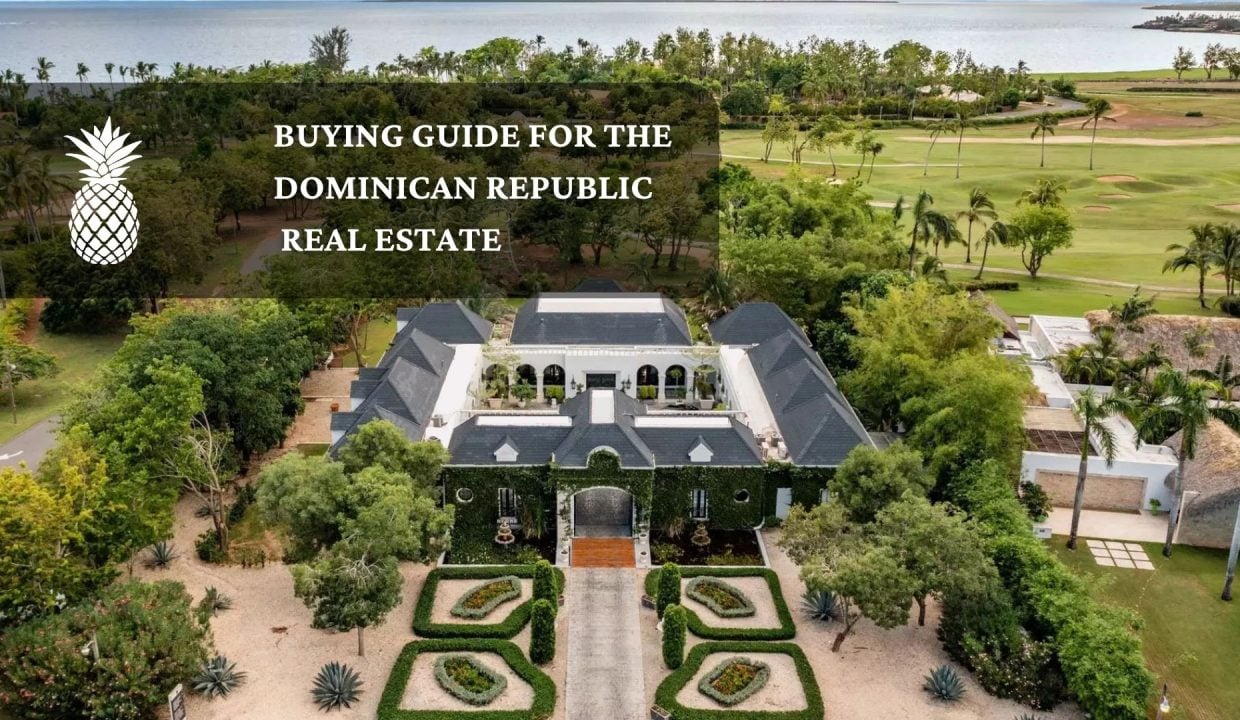
Key Takeaways
- Understanding the Dominican Republic's Real Estate Legal Framework
- Property Rights for Expatriates and Investors
- Navigating the Real Estate Transaction Process
- Exploring Investment Opportunities in Punta Cana
- Key Considerations for Foreign Investors
- The Pros and Cons of Property Development vs. Pre-Constructed Homes
- Essential Insights into Land Ownership Laws
- Market Analysis: Trends in Dominican Republic Real Estate
Understanding the Dominican Republic's Real Estate Legal Framework
The Dominican Republic, known for its pristine beaches and thriving tourism industry, is also a hotspot for real estate investments. Understanding the legal framework governing real estate in this Caribbean nation is crucial for any investor or expatriate looking to buy property. The laws here are distinct from other countries, and navigating them requires a keen understanding of local practices and regulations.

In the Dominican Republic, real estate transactions are governed by a series of laws and regulations designed to protect both buyers and sellers. These laws ensure transparency and fairness in transactions, making the Dominican Republic an attractive destination for international investors and expatriates. The legal framework covers everything from property rights to transaction procedures, offering a comprehensive system for real estate dealings.
Property Rights for Expatriates and Investors
When it comes to property rights in the Dominican Republic, the country offers a welcoming environment for foreign investors and expatriates. There are no restrictions on foreigners owning property, which opens up a world of opportunities for international buyers. Whether you’re looking at buying or selling property, it’s important to understand your rights and the legal processes involved.
Property rights in the Dominican Republic are robust and well-defined, providing security and peace of mind for property owners. As an investor or expatriate, you can own, lease, and sell property with the same rights as local citizens. However, it’s essential to be aware of the legal requirements and documentation needed to ensure a smooth transaction. From title searches to property registration, every step is crucial in safeguarding your investment.
Navigating the Real Estate Transaction Process
The real estate transaction process in the Dominican Republic involves several key steps that must be followed for a successful property acquisition. From initial property searches to finalizing the sale, each phase requires careful attention and understanding of local laws. If you’re new to the process or require assistance, our team is here to help.
The first step in any real estate transaction is conducting a thorough title search. This ensures the property is free of any liens or encumbrances and verifies the seller’s right to sell. Following this, a Promise of Sale is typically drafted, outlining the terms and conditions of the sale. Once both parties agree, the final contract is signed, and the payment is made. It’s crucial to have legal assistance during these stages to navigate any complexities that may arise.
Need Assistance Planning Your Dream Vacation?
Our team at Simply Dominican is here to make your travel dreams a reality.
Exploring Investment Opportunities in Punta Cana
Punta Cana, a name synonymous with paradise, is not just a haven for tourists but also a goldmine for real estate investors. The region’s booming real estate market is a testament to its growing popularity and investment viability. By investing in Punta Cana, you’re not just buying property; you’re investing in a lifestyle coveted by many.
The market here is diverse, offering everything from luxury villas to beachfront condos. Punta Cana’s real estate promises high returns due to its strong rental market driven by tourism. For investors, this means a steady stream of rental income, coupled with the potential for significant property value appreciation. Understanding the dynamics of Punta Cana’s real estate market is key to making a wise investment decision.
Key Considerations for Foreign Investors
The Dominican Republic is welcoming to foreign investors, but there are specific considerations to keep in mind. Understanding the nuances of home versus business ownership is crucial for making informed decisions. Foreign investors enjoy the same property rights as locals, but navigating the legal and financial landscape requires a strategic approach.
One important aspect is the tax implications of property ownership and how it affects your overall investment strategy. Additionally, understanding the processes for obtaining necessary permits and complying with local regulations is essential. Whether you’re looking to invest in residential or commercial property, being well-informed about these factors is crucial for a successful investment in the Dominican Republic‘s real estate market.
The Pros and Cons of Property Development vs. Pre-Constructed Homes
Choosing between developing a property from scratch and buying a pre-constructed home is a significant decision for any investor. Each option has its pros and cons, and understanding them is vital for aligning with your investment goals.
Developing a property allows for customization and potentially lower costs, but it also comes with longer timelines and the challenges of overseeing a construction project. On the other hand, pre-constructed homes offer the convenience of a turnkey solution, though they may come at a higher cost and with less customization. Your choice will depend on your investment objectives, risk tolerance, and desired level of involvement in the property development process.
Essential Insights into Land Ownership Laws
Navigating the land ownership laws in the Dominican Republic is a critical aspect of real estate investment. These laws govern the acquisition, use, and transfer of land, and understanding them is crucial for any investor. The country has specific regulations regarding zoning, land use, and development, which can impact your investment decisions.
It’s important to conduct due diligence when purchasing land, ensuring the property is suitable for your intended use and complies with local laws. Working with knowledgeable legal and real estate professionals can provide valuable insights and guidance throughout this process. By understanding and adhering to these laws, investors can safeguard their investments and avoid potential legal issues.
Market Analysis: Trends in Dominican Republic Real Estate
The Dominican Republic’s real estate market is dynamic and evolving, with trends that are important for investors to understand. The market has seen steady growth, driven by factors such as the growing tourism industry and foreign investment. Analyzing these trends can provide valuable insights into potential investment opportunities and risks.
Current trends indicate a strong demand for properties in tourist hotspots and emerging areas with development potential. The market is also seeing a shift towards sustainable and eco-friendly properties, reflecting a global trend in real estate. Keeping abreast of these trends is crucial for investors looking to make informed decisions and capitalize on the opportunities in the Dominican Republic’s real estate market.

Market Analysis: Trends in Dominican Republic Real Estate (Continued)
Keeping an eye on market trends is pivotal for strategic investment. Here are key trends shaping the Dominican Republic real estate landscape:
- Tourism-Driven Demand: Increased tourism in areas like Punta Cana fuels demand for vacation rentals and properties.
- Urban Development: Santo Domingo and other cities are seeing growth in commercial and residential developments.
- Eco-Friendly Properties: A rising trend towards sustainable living is influencing property development.
- Expatriate Communities: Growing communities of expatriates are shaping the demand for diverse property types.
These trends highlight the dynamic nature of the Dominican real estate market, offering diverse opportunities for investors.
Conclusion and Next Steps
In conclusion, understanding the real estate laws and regulations in the Dominican Republic is crucial for any investor or expatriate. With robust property rights, a welcoming attitude towards foreign investment, and a vibrant market, the Dominican Republic presents lucrative opportunities for real estate investment.
Next Steps for Potential Investors:
- Research and Due Diligence: Conduct thorough research and due diligence on potential properties and investment opportunities.
- Consult Experts: Engage with local real estate experts and legal advisors to navigate the investment process.
- Monitor Market Trends: Stay informed about the latest trends and developments in the Dominican real estate market.
- Plan Financially: Consider the financial implications, including taxes and potential returns on investment.
By following these steps and understanding the legal landscape, investors can confidently navigate the Dominican Republic real estate market.
Need Assistance Planning Your Dream Vacation?
Our team at Simply Dominican is here to make your travel dreams a reality.
FAQ Section
Are there restrictions on foreign real estate ownership in the Dominican Republic?
- No, there are no restrictions on foreigners owning property in the Dominican Republic.
What are the key legal considerations when buying property in the Dominican Republic?
- Key considerations include conducting a thorough title search, understanding tax implications, and ensuring compliance with local zoning and land use laws.
Is investing in Dominican Republic real estate a good idea?
- Yes, with its growing tourism industry and robust legal framework, the Dominican Republic offers attractive opportunities for real estate investment.
Can expatriates own land in the Dominican Republic?
- Yes, expatriates can own land with the same rights as local citizens.
What are the trends in the Dominican Republic's real estate market?
- Key trends include tourism-driven demand, urban development, eco-friendly properties, and growing expatriate communities.
